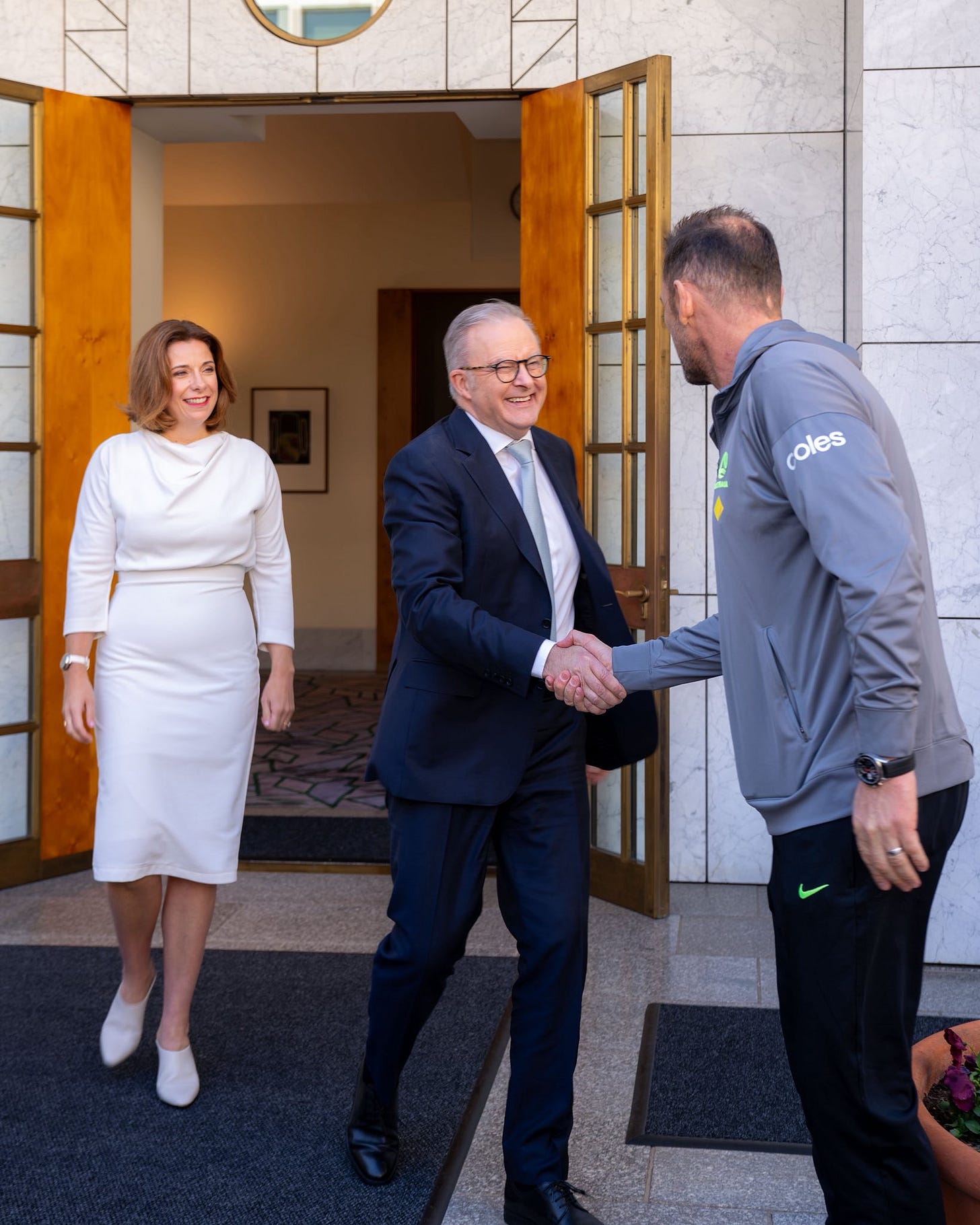Albanese Heads to Pacific as Strategic Expert Warns of Weakened Western Alliance Against China
Today’s email is brought to you by Empower your podcasting vision with a suite of creative solutions at your fingertips.
Prime Minister Anthony Albanese embarked on crucial Pacific diplomacy Monday as a strategic expert warned that U.S. tariffs on India have damaged the Quad alliance and delivered a "big publicity win" to China in the Indo-Pacific region.
Mark Watson, Senior Fellow at the Australian Strategic Policy Institute, told Sky News that Trump administration policies have created unintended consequences that undermine Western strategic positioning against China.
"So bad was the impact of that tariff that India felt it could go straight to China and give Xi Jinping a big publicity win," Watson said during the Newsday program.
Albanese traveled to Vanuatu Monday for high-level security discussions before attending the Pacific Island Forum, as Australia intensifies efforts to counter Chinese influence in the region.
Watson described the Pacific engagement as essential given strategic competition between China and Australia-U.S. alliance partners.
"What we're seeing playing out before our eyes is the competition in the Pacific that we see between China on the one hand, Australia on the other, and of course US, you know, behind the scenes, I guess, in the other side of the Pacific," he said.
The Prime Minister indicated that a security agreement with Vanuatu would not be finalized during Monday's visit, preferring face-to-face discussions to advance negotiations.
Watson noted that Vanuatu and Solomon Islands represent particular challenges for Australian diplomacy in the region.
"The two problem countries, though, in some ways, for Australia at least, have been Vanuatu and the Solomon Islands. They've kind of gone back and forward on this issue," he said.
Truth matters. Quality journalism costs.
Your subscription to Mencari directly funds the investigative reporting our democracy needs. For less than a coffee per week, you enable our journalists to uncover stories that powerful interests would rather keep hidden. There is no corporate influence involved. No compromises. Just honest journalism when we need it most.
Not ready to be paid subscribe, but appreciate the newsletter ? Grab us a beer or snag the exclusive ad spot at the top of next week's newsletter.
Australia believed it had secured an in-principle agreement with Vanuatu last month when three ministers visited for initial negotiations, but Pacific politics proved more complex than anticipated.
"As things often are in the Pacific, things change very quickly. The Prime Minister made the point this morning that politics in a small country like Vanuatu can be complicated as well," Watson said.
The strategic expert emphasized Australia's lack of alternatives in Pacific engagement.
"We have no choice. I mean, this is our backyard and we take it seriously and we take our relationships with Pacific Island countries seriously," Watson said.
He described Pacific competition as part of broader strategic rivalry between the United States and China affecting Australia's regional position.
"Playing out behind that is this new great game of strategic competition in our part of the world between the US and China. And Australia is keen to make sure that we are seen as the partner of first choice in the Pacific and not China," Watson said.
The competition has created what Watson termed "a slightly comical bidding war on things like SUVs and police equipment and so forth" as both sides seek Pacific nation support.
Australia's Pacific focus extends beyond Vanuatu, with Albanese scheduled to attend Papua New Guinea's independence anniversary celebrations next week.
"That'll be a very big event and... For a nation on our doorstep," Watson noted, describing PNG as "the nation that, you know, when they took independence they took it from australia so you know 1975 this new country was born right on our doorstep."
China's investments in PNG minerals, infrastructure, highways and public buildings over recent years have created competitive pressure requiring Australian response.
"We may have just missed a trick there initially but i think we're back," Watson said.
The expert highlighted rugby league as Australia's unique diplomatic advantage in the region.
"The one thing China doesn't have is rugby league. Rugby league. It's the number one diplomatic tool we have," Watson said, noting State of Origin's massive popularity in PNG.
The Pacific diplomacy occurs amid escalating conflict in Ukraine, where Russia launched its largest aerial assault since the war began, deploying over 800 drones and targeting government buildings for the first time.
Watson assessed that Russia sees itself in a strong military position, reducing incentives for negotiation.
"I think Russia feels now it's on the front foot, on the military front. Plus, it just launched, what, 800-plus drones and, I think, 13, 14 missiles into Ukraine. It hit the Ukraine government buildings," he said.
"I think Russia is in no mood to negotiate, and that's what we've seen play out, I think, in the US-mediated talks. I think Russia goes, why... Why come to the table now? We're winning," Watson said.
Russia's resilience has surprised observers given extensive international sanctions.
"Russia is already the most sanctioned country in the world, probably in world history. There's something like 23,000 separate sanctions on Russian entities and individuals," Watson said.
Despite sanctions, Russian economic performance has exceeded expectations.
"It has set the Russian economy back somewhat, but you wouldn't say it's brought it to its knees, as many expected. In fact, its GDP is growing," he said.
The expert questioned the effectiveness of additional sanctions given existing comprehensive measures.
"There's a question around how many more sanctions you can impose to achieve a result," Watson said.
Trump's tariff approach has proven counterproductive, particularly the 50% tariff imposed on India.
"When you impose tariffs, which is kind of the sister... impact that Donald Trump's trying to impose on Russia and its partners, it's been counterproductive because he put a 50% tariff on India," Watson said.
The India tariff immediately damaged the U.S.-India relationship and weakened the Quad alliance mechanism designed to counter Chinese influence.
"And where do we see India immediately after? They're off to China to shake hands with President Putin and Xi Jinping. So sometimes these things have unintended consequences," Watson said.
The Quad deterioration represents a significant setback for Western Indo-Pacific strategy.
"It was a really, as it turned out, counterproductive measure taken by the US, and it led to an almost instant degrading of the bilateral relationship," Watson said.
Australia faces indirect impacts from the India-China rapprochement despite not being directly targeted by U.S. tariffs.
"I think Australia is not directly impacted. We're as opposed to tariffs as anybody else is, US tariffs. But that quad, we keep coming back to that. It was a way of engaging India in our part of the world," Watson said.
The expert emphasized India's fundamental importance to regional strategy.
"There is no Indo-Pacific without India. Australia will, I'm sure, work hard to maintain that engagement, but it is to the detriment of the quad for sure," he said.
The India-China meeting holds particular significance given their recent military confrontations along disputed borders.
"Remembering that China and India, you know, have fought wars on their frontiers and quite recently have sustained casualties, and yet so bad was the impact of that tariff that India felt it could go straight to China," Watson said.
The developments create challenges for Australia's strategic positioning as it seeks to maintain Indo-Pacific partnerships while managing Pacific competition with China.
Watson's assessment highlights the complex interconnections between U.S. trade policies, regional alliances, and strategic competition affecting Australia's security environment.
The Pacific Island Forum represents an opportunity for Australia to demonstrate regional leadership while addressing concerns about Chinese influence among smaller Pacific nations.
Albanese's extended Pacific engagement, including PNG independence celebrations, signals continued Australian commitment to regional partnerships despite broader strategic challenges.
The Prime Minister's face-to-face approach with Vanuatu reflects lessons learned about Pacific diplomatic complexities requiring sustained personal engagement rather than technical negotiations alone.
Australia's rugby league diplomacy demonstrates the importance of cultural connections alongside economic and security partnerships in regional competition.
The strategic expert's warnings about Quad deterioration underscore broader challenges facing Western alliance structures in responding to Chinese influence and maintaining regional cooperation.
As Australia navigates Pacific diplomacy this week, Watson's analysis provides context for understanding the multiple pressures affecting regional strategic balance and alliance effectiveness.
The intersection of Pacific competition, Ukraine conflict developments, and alliance challenges creates a complex strategic environment requiring careful Australian diplomatic management.
Got a News Tip?
Contact our editor via Proton Mail encrypted, X Direct Message, LinkedIn, or email. You can securely message him on Signal by using his username, Miko Santos.
Sustaining Mencari Requires Your Support
Independent journalism costs money. Help us continue delivering in-depth investigations and unfiltered commentary on the world's real stories. Your financial contribution enables thorough investigative work and thoughtful analysis, all supported by a dedicated community committed to accuracy and transparency.
Subscribe today to unlock our full archive of investigative reporting and fearless analysis. Subscribing to independent media outlets represents more than just information consumption—it embodies a commitment to factual reporting.
As well as knowing you’re keeping Mencari (Australia) alive, you’ll also get:
Get breaking news AS IT HAPPENS - Gain instant access to our real-time coverage and analysis when major stories break, keeping you ahead of the curve
Unlock our COMPLETE content library - Enjoy unlimited access to every newsletter, podcast episode, and exclusive archive—all seamlessly available in your favorite podcast apps.
Join the conversation that matters - Be part of our vibrant community with full commenting privileges on all content, directly supporting The Evening Post (Australia)
Catch up on some of Mencari’s recent stories:
It only takes a minute to help us investigate fearlessly and expose lies and wrongdoing to hold power accountable. Thanks!








